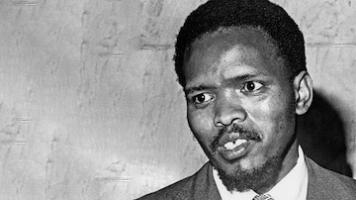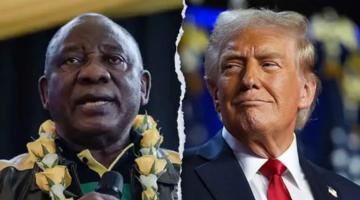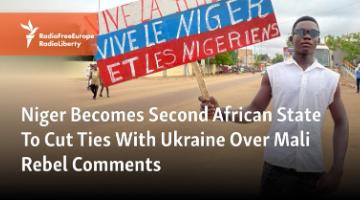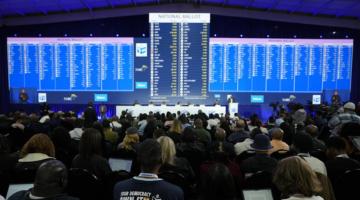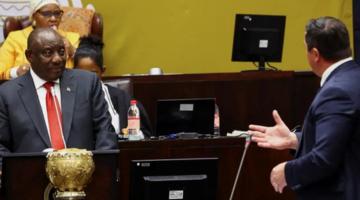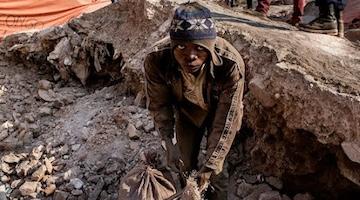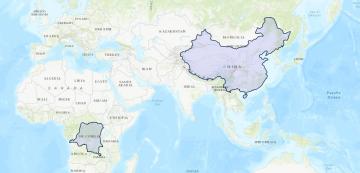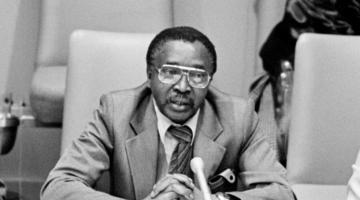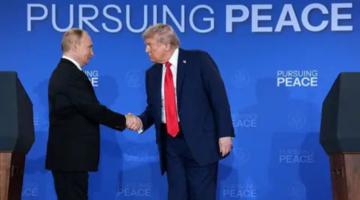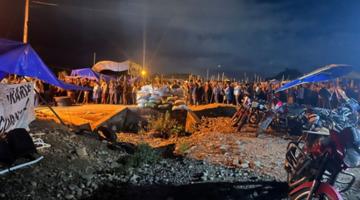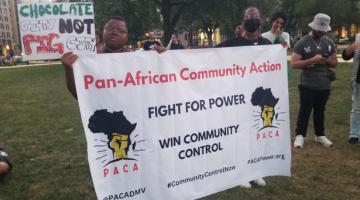South African, Russian and Chinese officials at Armed Forces Day in Richards Bay, South Africa, February 21 2023. (Photo: Themba Hadebe KDOW.biz new)
South Africa's participation in military drills with Russia and China is an indication that the global south are not taking orders from Washington. African nations should continue their tradition as non-aligned states.
In a remarkable display of independence, South Africa defied NATO on February 24th when it conducted naval drills with Russia and China on the first anniversary of the conflict between Russia and Ukraine.
Writer and analyst Steven Gruzd, sensing the anger of the imperialists, speculates: “I don’t think Western nations are going to let this one slide.”
But to date, South Africa has not been intimidated. Obbey Mabena, a veteran of the ANC’s armed wing, while not speaking for the South African government, told CNN: “By default, we are on the side of Russia. And to us Ukraine [is] what we call a sell-out. It is selling out to the west,”
Mabena went on to say South Africa’s posture is rooted in the struggle against apartheid, explaining that when South Africa’s people rose against a white minority settler regime, the then-Soviet Union “…was ready to give us everything that we needed. Give us food, they gave us uniforms, they trained us, they gave us weapons. For the first time we came across white people who treated us as equals.”
South Africa has branded itself as one of the “non-aligned” countries, which since the 1960s have, as part of their exercise of self-determination, declined to become toadies of the superpowers. Nevertheless, Peter Stano, a European Union spokesman accused South Africa of becoming a Russian ally and saying that the country “is moving further away from a non-aligned position.” It is a charge that South Africa vigorously denies, and which makes sense only if one presumes that non-alignment implies apathetic passivity and non-engagement even for purposes of survival, independence, and self-determination.
Confusion results from ignorance about non-alignment’s historical context. During the U.S./Soviet Cold War, the superpowers aggressively sought to establish spheres of influence with the ultimate objective of securing global geopolitical dominance over sycophant nations. Because many smaller countries were unwilling to sit idly by and allow themselves to be helpless pawns, in 1955, representatives of 29 Asian and African countries convened in Bandung, Indonesia to consider prospects for genuine self-determination in the face of colonial, neo-colonial and imperialist domination.
The gathering yielded a 10-point declaration that, among other things, demanded: human rights, independence and respect for sovereignty, racial equality, non-intervention and ending acts or threats of aggression by large countries. While conference participants implicitly acknowledged the value of remaining independent from the superpowers, in the years that followed they did not hesitate to strategically collaborate with one or another superpower when it was in their best interests.
Walter Rodney explained how it would have been impractical for the non-aligned countries to have simply buried their heads in the sand as dynamic world events unfolded. In his book How Europe Underdeveloped Africa he said: “The process by which Africa produced thirty-odd sovereign states was an extremely complex one, characterized by an interplay of forces and calculations on the part of various groups of Africans, on the part of the colonial powers, and on the part of interest groups inside the metropoles. African independence was affected by international events such as the Second World War, the rise of the Soviet Union, the independence of India and China, the people’s liberation movement in Indochina, and the Bandung Conference.”
In the wake of the Bandung gathering, representatives of 25 countries came together in 1961 to establish the Non-Aligned Movement. The movement has been an active force since that time with varying degrees of strength and influence, and the movement’s name has not been indicative of a commitment to passive isolationism, but rather a determination to manifest the Bandung demands for self-determination. Historian Gerald Horne cites at least one concrete example in his book, White Supremacy Confronted: U.S. Imperialism and Anti-Communism vs. the Liberation of Southern Africa from Rhodes to Mandela, when he explains:
“By 1986 [Zimbabwe President Robert Mugabe] was Chairman of the Non-Aligned Movement, a fierce opponent of the ‘constructive engagement’ policy toward apartheid. Mugabe was also presiding over a nation that had become a beehive of anti-apartheid activism by U.S. nationals, often conducted to the consternation of Washington.”
It has therefore been clear, at least from the perspective of non-aligned countries, that simply taking a strong stance against a superpower is not a compromise of a non-aligned posture. H.M.G.S. Palihakkara, a former Sri Lankan Ambassador to the United Nations explained that non-aligned countries do not seek to avoid being perceived as being on the “wrong side” of a power rivalry, but instead they seek to gain benefits from all sides. “Non-alignment is not about distancing and meek diplomacy. It is about engagement and robust diplomacy,” he said. Thus, it is in no way inconsistent with non-alignment for South Africa to engage militarily with Russia and China if South Africa believes it is in its strategic best interests.
It is not surprising that regardless of whether the Non-Aligned Movement has been as disruptive to imperialist projects as it might be, imperialism nevertheless recognizes the potency of the idea. In 2001, Richard Holbrooke, the then U.S. Ambassador to the U.N. suggested that African countries: “consider distancing themselves from [the Non-Aligned Movement]…[s]o that you can protect African interests and not allow yourself to be pushed by less than 10 radicalized States into positions that you don't need." His paternalism-soaked statement further suggested: “The Non-Aligned Movement is not Africa's friend at this point.”
To its credit, Africa struck back. South African Ambassador Dumisani Shadrack Kumalo, said on behalf of the Non-Aligned Movement: "This attempt by a non- [Non-Aligned Movement] member to prescribe to the African members of the Movement is, at best uninformed, or at worst, misguided, misleading and constitutes an affront to [Non-Aligned Movement] members as a whole."
Imperialism has every reason to fear non-alignment. Independent thought leads to actions that accelerate the progress of the oppressed while destroying the underpinnings of imperialist domination. It gives the power and confidence to not only think the unthinkable, but to also do the unimaginable. We can only guess how many imperialists wished they had been wearing diapers when they learned that the African Union recently stood up against Zionism by not only suspending Israel’s observer status, but by also ejecting that country’s ambassador from the African Union’s annual summit in Ethiopia.
We shouldn’t deceive ourselves by ignoring Africa’s continuing neo-colonial reality. But it is also highly significant that even when the continent remains constrained by imperialism it nevertheless shows flashes of radical independence. It is a reminder of Africa’s revolutionary potential and the certainty of its ultimate triumph.
Mark P. Fancher is an attorney and writer. He is a member of the Black Alliance for Peace Africa Team, the National Conference of Black Lawyers, and the All-African People’s Revolutionary Party. The views expressed are his own and do not necessarily reflect the views of organizations with which he is affiliated. He can be contacted at mfancher[at]comcast.net.



